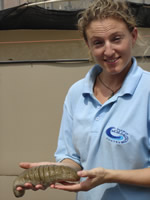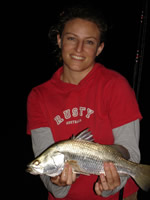|
Where did you grow up and go to school?
I grew up in the beautiful ocean coastline of Esperance, which is a small country town in Western Australia. I spent my primary and high school years in Esperance but as there is no university, I had to move to the big smoke.
 What inspired you to do science? What inspired you to do science?
I have always been fascinated about nature, especially the ocean. I am always in the water in my spare time, diving, surfing or fishing. Whenever a David Attenborough documentary was showing on television I would always think, wouldn't it be cool to have a job that you love going to each day and learning really interesting things.
What did you study at university?
My university studies started in Hobart where I began a Bachelor of Science degree. The degree is very flexible as you can choose whatever area you want to go into; botany, geology, etc., and then you have a wide variety of units to pick from within that subject. I majored in Zoology as these units were very marine focused and this was the area I wanted to specialize in. Once I completed the Bachelor of Science I decided to focus my interests on endocrinology in fish, so I applied to do a Bachelor of Aquaculture with Honours. A Fish Endocrinologist from the School of Aquaculture was offering an Honours program that involved trying to increase the growth of barramundi by manipulating the hormone 'Melatonin'. This took me up to the campus at Launceston as the School of Aquaculture where the school is based.
 What are you doing now? What are you doing now?
After Honours, I decided to get some hands-on experience working within the barramundi industry. This led me to Darwin working for the Darwin Aquaculture Centre, where I worked as a Technical Officer. This involved looking after barramundi broodstock, spawning the fish, collecting their eggs and larval rearing after the eggs hatch. Whilst I was in Darwin, a couple of commercial barramundi farms were interested in my Honours results and were keen to trial the methods on their farms to try and increase the growth of their barramundi. This led to a PhD this year with the School of Aquaculture and in conjunction with the two barramundi farms. Although I am based in Launceston, the experimental trials will be conducted on the farms in Cairns and Adelaide. Tragically (sarcasim!) this means I have to fly up to Cairns and across to Adelaide numerous times throughout the year (which is a perfect to defrost from the Tassie winter!) On completion of the PhD, in three years time, my work options are quite open. Working with industry allows you to meet, work and network with a lot of people within the industry which helps when looking for employment. Another option could be to continue in research or academia with the university or other research partners such as CSIRO, AIMS or TAFI.
What do you love about science?
I love being able to pose a question, set up an experiment to test your theory and then find out if your theory happened as expected. If it didn't, you have still learned something and have a better knowledge or understanding than before the experiment. If it does, you have the satisfaction of being able to pass on this knowledge to people it may help. For example, you may provide farmers with information that will be helpful to them - better their practices or increase their production which ultimately increases their economics.
|
|
